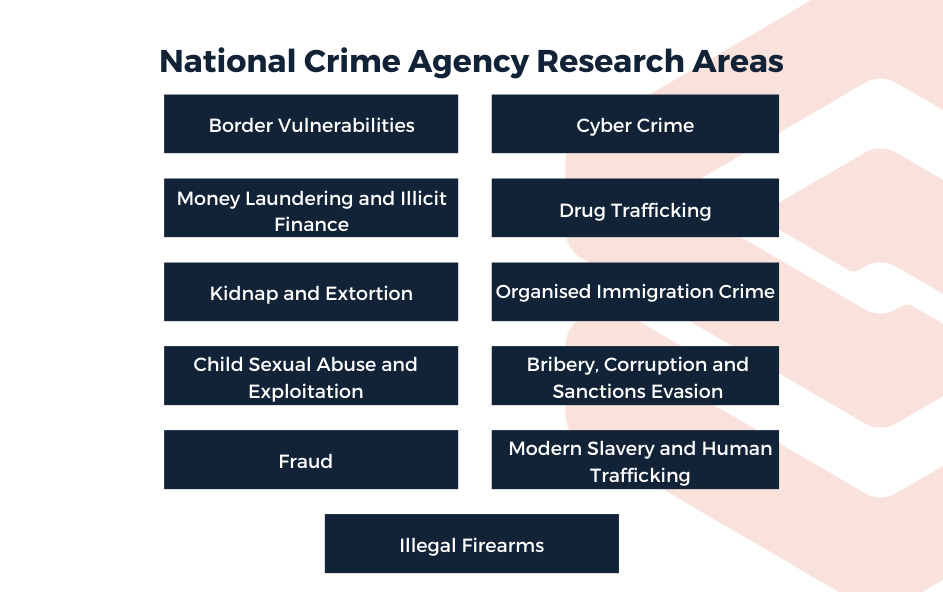The National Crime Agency (NCA) was established in 2013 to eradicate severe and organized crime in the United Kingdom (UK). The NCA assesses the threat from organized and major crime and the impact of those crimes and reports it in the National Strategic Assessment. There is more than 5,500 national crime agency staff, 150 of whom work in 50 countries worldwide. The two functions of the National Crime Agency included in the statute are crime reduction and crime intelligence.
NCA works to eradicate existing severe and organized crime in the UK. NCA officers track down the most brutal and risky criminals and then work at the forefront of law enforcement and crime act, creating the best possible intelligence on serious and organized crime threats.

Financial crimes are one of the most dangerous threats to the UK economy. The damage done by a wide range of crimes is also relatively high; They cost the UK at least £37 billion each year. The National Crime Agency identifies the financial offenders who pose the highest risk to the UK and brings criminals to justice. Identifying and eliminating organized criminals is of paramount importance in the UK. Reducing crime rates also reduces the damage that crime does to the economy and ensures protecting the public.
How does the National Crime Agency investigate crime in the UK?
The investigations conducted by the NCA are essentially collected based on intelligence to answer questions about who, when, why, where, and how they committed the crimes. In addition, the National Engagement and Coordination function is at the heart of the NCA, providing a comprehensive view of threats and operations and informing decisions about how resources should be used.
The National Crime Agency collects three types of information;
- Information of persons suspected of involvement in organized crime and persons connected to them
- Information that enables the NCA to recognize and profile those involved in activities within the agency's jurisdiction
- Other information linked to the effects of organized crime
The operations conducted by the agency and the information the NCA collects are the results of investigations conducted by UK law enforcement agencies into government agencies and the private sector.
What is the National Crime Agency's Economic Crime Command?
The National Crime Agency's Economic Crime Command (ECC) works with partners in the UK economy to reduce the impact of economic crime and fight to cut serious and organized crime threats. Economic crime includes money laundering, corruption, and fraud.
The National Crime Agency (NCA) and Money Laundering
Money laundering is the foundation of many organized crime units, enabling other crimes to occur. Criminals use money laundering methods to carry out their activities and hide the source of proceeds of crime. Hundreds of billions of pounds in the United Kingdom are laundered annually, and these figures harm the UK economy. The money laundering finance sector is also critical for the UK economy. The laundering of large amounts of illegal funds through financial sectors can threaten or even weaken the UK's national security and welfare. These crimes must be eliminated for the integrity and international reputation of the UK financial system. For this, NCA fights illegal financial situations from criminal activities locally and internationally.
NCA Response for Money Laundering and Illicit Finance
National Crime Agency (NCA)'s prosecution and convictions of persons involved in money laundering and disruption of techniques, recovery, and seizure of assets acquired through crimes committed, educating law enforcement financial inspectors in the UK, making it difficult to abuse the UK financial system It has goals and objectives. Finance is increasingly global, with money and assets rushing across jurisdictions, products, and services. NCA works with local and international partners to tackle the global money laundering threat. Also, private sector involvement is essential to respond to money laundering effectively. Working with major financial institutions plays a significant role in identifying and eliminating money laundering activities in the UK and worldwide.
The NCA needs to partner with other law enforcement and private sector organizations to support financial institutions' efforts, provide education and understanding to help financial personnel detect money laundering signs, and develop new ways to identify and arrest criminals. In addition, the National Crime Agency can prevent further criminal activity by identifying and controlling money laundering, making the UK a problematic environment for criminals who want to commit illegal actions.
NCA Supports Victims and Survivors
Protecting victims of crime and vulnerable people is at the heart of the NCA. Within the NCA, there are employees, special officers, consultants, and teams for different roles.
- They are decisive in providing all kinds of care, support, and protection, including court processes.
- A Witness Care Officer is appointed to meet the needs of the victims of the crime under investigation, and the officer also informs the victims about the procedure.
- A Witness Care Officer makes the notifications clear and straightforward in their language to not force the victim.
- In addition to the victim's protection, NCA also protects their families.
- The Victim Identification Team protects children who are sexually abused. The children identified in this study are often still actively under the control of the abuser and are challenging to find and care for without conducting this study.
- The Child Protection Team receives reports on children who have been or are at risk of sexual abuse or exploitation.
- The Specialist Witness Team provides operational support to the investigative team in witness management across all NCA crime types.
- The National Vulnerable Witness Adviser regularly supports major investigations to develop strategies for interviewing and presenting witnesses in trials.

